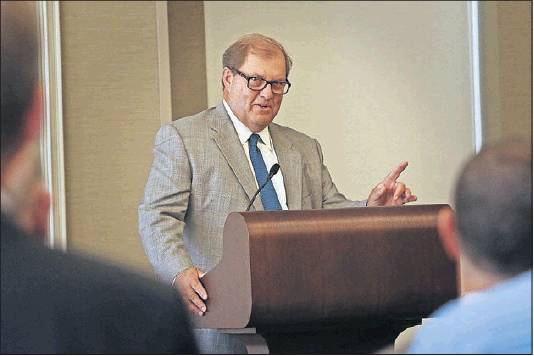Marathon to spin off Speedway, change execs
By David WetheBloomberg News
Marathon Petroleum Corp. buckled under pressure from shareholders and announced the spinoff of its retail fuel-station business and the departure of its Chairman and Chief Executive Officer, just five weeks after activist investor Elliott Management Corp. went public with demands for a radical overhaul of the company.
Marathon, based in Findlay, confirmed the plan Thursday, along with a review of its pipeline business. Gary Heminger, a four-decade company veteran, will retire next year and is stepping down from pipeline affiliate MPLX LP this week. Executive Vice Chairman Gregory Goff, who has been discussed as a possible successor to Heminger, is also retiring.
The sweeping changes give the dissident shareholders much of what they were looking for. Elliott had called on Marathon, the second-largest U.S. oil refiner, to improve its performance by breaking itself up into three separate companies: retail, which largely operates under the Speedway brand, refining and pipelines. Other investors had agitated for Heminger’s ouster.
“The wish list was pretty well fulfilled with today’s slew of announcements,” said Roger Read, an analyst at Wells Fargo Securities.
The company also on Thursday reported third quarter adjusted earnings per share of $1.63, above estimates of $1.30. However, the bottom line was 4.1% below the year-earlier quarter’s earnings due to higher costs and expenses.
Marathon closed at $63.95 Thursday, down 3.4%.
The CEO’s retirement, first reported by Bloomberg, will come after next year’s shareholders meeting. Marathon said it will search both in and outside of the company for potential successors.
The shareholders meeting will also see Marathon put to a vote the de-staggering of board members so that all directors stand for reelection annually instead of just a few at a time, as the case is now, according to people familiar with the matter.
In contrast to Heminger’s exit, Goff’s departure has come as a surprise. The activists had viewed him as a well-respected executive who could have taken on the top job.
Goff had joined Marathon after its purchase of rival refiner Andeavor last year.
However, by the time the CEO search process concludes, Goff will have little more than a year left before hitting Marathon’s mandatory retirement age of 65, and that’s one reason why he chose to leave, according to the people, who asked not be identified because the information hasn’t been made public. Heminger was exempted from the age limit last year.
There are no standstill agreements in place with any of the activists, meaning that they’re free to agitate for further changes if they don’t like the direction the company is going in, the people said. A Marathon representative didn’t immediately respond to a request for comment.
“The actions announced today will unlock substantial value for shareholders,” Elliott said in a statement. “We commend Gary and the board for taking action to allow these businesses to realize their full potential.”
Heminger took charge of the fuel maker when it was spun off from Marathon Oil Corp. in 2011.
While he has previously assuaged investors including Jana Partners and overseen a fivefold rise in dividend payouts, the company faltered more recently as it sought to expand through acquisitions, including the purchase of Andeavor.
As part of the planned separation, Speedway will raise new debt and pay a dividend to Marathon, Heminger told analysts and investors on a conference call. The unit has a potential enterprise value of $15 billion to $18 billion, according to Marathon, which plans to retain its direct-dealer business.
The separation of Speedway won’t require a shareholder vote, but will be subject to final approval by the board and other customary conditions.

